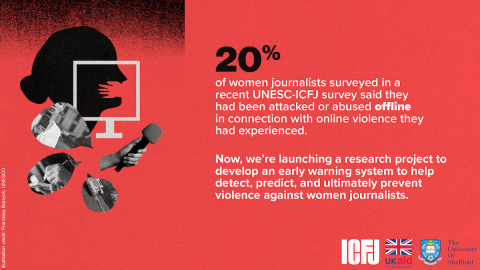
The International Center for Journalists’ (ICFJ) “trailblazing” research into online violence has led to a grant from the UK Government to work on an early warning system to help detect, predict, and ultimately prevent violence against women journalists.
In partnership with computer scientists from the University of Sheffield and the Centre for Freedom of the Media (CFOM), ICFJ’s research division will lead a major project designed to identify key indicators and metrics signalling escalation of online violence against women journalists. They will study the two-way trajectory between online and offline attacks before developing open-source digital tools to detect, monitor and alert key responders to high-risk cases.
Nobel Peace Prize Laureate Maria Ressa, whose experience of online violence was the focus of a recent ‘big data’ case study published by ICFJ, will serve on the advisory panel for the project: “It is essential that we work out how to predict and stem online attacks on women journalists, which can so easily morph into offline harassment and abuse,” she said. “I have been repeatedly threatened with rape and murder in a misogynistic and disinformation-laced campaign designed to shut me up, and shut Rappler down. It has been fueled by the state and enabled by the platforms, and it’s directly linked to the legal harassment I experience in the Philippines that still threatens me with decades in prison.”
This new project comes in response to UNESCO-ICFJ research which found that 20% of women journalists surveyed had experienced offline attacks that they associated with online violence. That study recommended development of an early warning system (EWS):
Consider initiating a multi-stakeholder ‘early warning system’ to trigger interventions (including from UN Special Rapporteurs) in cases where there is a significant risk to a target under attack online.
Responding directly to that recommendation, the UK’s Foreign Commonwealth and Development Office (FCDO) has granted over $400,000 to fund research towards an early warning system designed to detect and predict the threat of violence and harassment against women journalists (online and offline). This system will use online attack indicators and other metrics derived from five new ‘big data’ case studies focused on women in India, Lebanon, Malta, Mexico and South Africa.
“This project represents an urgent, practical response to one of the key needs identified through our research into online violence - an early warning system to support rapid response assistance for women journalists under serious or sustained attack online,” said Dr. Julie Posetti, ICFJ’s global director of research. “Increasingly, such attacks are associated with offline abuse, harassment and physical violence, and we need a focus on responses that work to predict, alert and prevent such threat escalation.”
Posetti discussed the need for an early warning system to respond to gendered online violence in a BBC Panorama documentary about the abuse of women on social media to air in the UK on October 18.
University of Sheffield computer scientists Professor Kalina Bontcheva and Dr. Diana Maynard will partner with ICFJ’s research team, bringing considerable technological expertise. “This project is particularly groundbreaking because until now, incidents and individual cases are typically studied in isolation, with very little research into the pathways of abuse escalation,” Maynard said. “The introduction of computational methods and language processing techniques makes it possible to study the wider picture and to find connections between people, events, and context.”
In addition to Maria Ressa, the project advisory panel will include respected international human rights lawyer Caoilfhionn Gallagher QC (who represents Ressa), Reporters Without Borders (RSF) Global Campaigns Director Rebecca Vincent and other leading experts from industry, civil society and intergovernmental organizations.
Contacts:
ICFJ: Erin Stock, ICFJ Communications Director estock@icfj.org; Dr. Julie Posetti, ICFJ global director of research jposetti@icfj.org
University of Sheffield: Sean Barton, Media and PR Officer s.barton@sheffield.ac.uk; Dr Diana Maynard, Senior Research Fellow in Computer Science d.maynard@sheffield.ac.uk